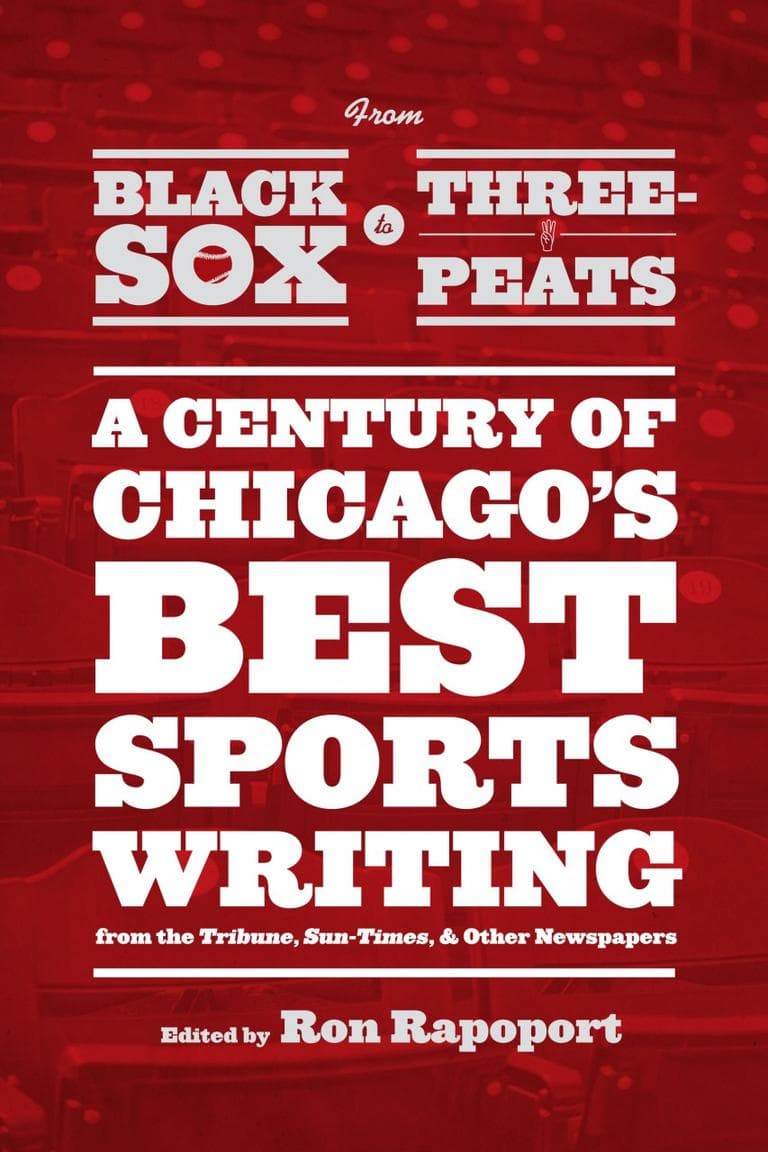Advertisement
Featured Book
'From Black Sox To Three-Peats' Chronicles The History Of Chicago Sports
Chicago has a rich sports history. Team allegiances are almost religious. Veteran Chicago sports columnist Ron Rapoport has assembled 100 of the best columns and articles from the city in his book From Black Sox to Three-Peats: A Century of Chicago's Best Sportswriting from the 'Tribune,' 'Sun-Times,' and Other Newspapers. Rapoport joined Bill Littlefield.
Highlights From Bill's Conversation with Ron Rapoport
BL: There's lots of writing about the Cubs here, inevitably. One of them is yours titled "Roof Bums." The last lines of that story are beautifully understated. It goes like this: "'The last game of the year is always so sad,' Jill said. 'It signals the end of summer and the beginning of bad weather,' Rita answered. 'Last year," Jill said, 'my daughter cried.'" Boy, you really found the right people to talk to on that roof overlooking Wrigley Field.
RR: Well, thanks, Bill. I always liked that column because it was one of those I-can't-believe-they're-paying-me-to-do-this columns. They don't come along very often. But I have to admit, looking at it today, it's really kind of quaint cause the owners of the buildings across from Wrigley Field now charge as much money to see a game from the roof as the Cubs do for seats in the stadium. But it wasn't long ago that the rooftops were free to people. You know how I got up on that roof? I wandered over to Waveland Avenue. I saw those ladies sitting up on that roof. I waved to them. They waved to me and the next thing you know I was up there on the roof watching the game with them. You can't do that today. So it was pretty quaint.

BL: The other Cubs column I want to mention is by Mike Royko, and it's a book review, sort of. Mr. Royko kicks, tears apart, and otherwise mauls a book by Keith Hernandez of the New York Mets. He uses bits of it for kindling and then he tries to read from it. Could a baseball story column like that be written in any other city?
RR: I think not. You know, Mike was not a sports columnist, but the column you mention is to me the funniest sports column I have ever read. You know, "I will begin my review by saying that this is a very solid book. The moment I opened the package and saw what it was about, I threw it against my office wall as hard as I could. Then I slammed it to the floor and jumped up and down on it. I beat on it with a chair for several minutes until I slumped onto my couch, emotionally and physically spent. Although slightly scuffed, the book was still intact."
BL: And that is before he starts ripping out pages and using them for kindling.
RR: Well, the last lines are classic: "Then I pour myself a drink, lower the lights, sit back, and stare at the crackling flames. And I pretend that I’m looking at Shea Stadium."
BL: One of the most powerful columns in the collection is by Wendell Smith. Many of our listeners may not be familiar with his work. Tell us a bit about Mr. Smith and the column titled "We're Tired of Staying in Flophouses."
RR: Well, Wendell Smith was the most influential black sports writer of them all. He spent much of his career at The Pittsburgh Courier and his work was syndicated throughout the black newspapers — The Chicago Defender ran a lot of it. Late in his career, Wendell comes to Chicago. Now he's working for a white newspaper, The Chicago American. He gets his first baseball writers card; they wouldn't let him in the press box without a writers card when he was working for a black newspaper. Well, he immediately sees that it's 1961 or 1962 now, 14, 15 years after baseball's been integrated, and he immediately goes after, begins another crusade, to end segregation in spring training.
In particular, he goes after the White Sox because that's the Chicago team he's involved with. They're in Sarasota and the headline of the column is — he quotes some of the players saying, "We are tired of living in flophouses." He writes a number of columns — and I'm proud to have two of them in the book — just holding the White Sox's feet to the fire and embarrassing them to tears. Well Wendell had, just as he had helped Jackie Robinson enter baseball, he almost single-handedly ended segregation in spring training. The White Sox went out next year and bought their own hotel. All the players, black and white, lived together, and within a couple years, all of spring training through all of baseball was integrated. Wendell Smith was a great man.
Advertisement
Bill's Thoughts on From Black Sox to Three-Peats
[sidebar title="An Excerpt from "From Black Sox To Three-Peats"" align="right"]Read an excerpt from 'From Black Sox To Three-Peats.'[/sidebar]Chicago's teams have provided sports writers with at least as much great material as the teams from any other city. The Cubs alone have inspired more columns of woe than anyone can count.
The range of writers represented in this collection is extraordinary: Ring Lardner, Wendell Smith, Mike Royko, John Schulian, Skip Bayless, Jeannie Morris, and Ron Rapoport himself. There are grand stories about the White Sox, the Bears, the Blackhawks, the Bulls, and the aforementioned Cubs, but there are also stories about black players denied equal housing during spring training as late as 1961, female athletes denied the recognition they have earned, and the grand and glorious Bill Veeck.
Obviously anybody with a connection to sports in Chicago will enjoy this book, but it will also delight any reader who appreciates wit and grace produced under the pressure of a newspaper deadline.
This segment aired on October 5, 2013.
